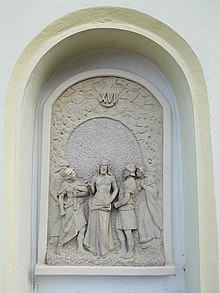
Back يوم الرب Arabic يوم الرب ARZ Adlaw sa Ginuo CEB Dydd yr Arglwydd CY Tag des Herrn German Día del Señor Spanish روز خداوند FA Hari Tuhan ID 主日 Japanese 주일 (기독교) Korean


In Christianity, the Lord's Day refers to Sunday, the principal day of communal worship. It is the first day of the week in the Hebrew calendar and traditional Christian calendars, with the exception of European (workweek) calendars.[1][2] It is observed by most Christians as the weekly memorial of the resurrection of Jesus Christ, who is said to have been raised from the dead early on the first day of the week. The phrase appears only once in Rev. 1:10 of the New Testament.
According to Beckwith, Christians held corporate worship on Sunday in the 1st century[3] (First Apology, chapter 67). On 3 March 321, Constantine the Great legislated rest on the pagan holiday Sunday (dies Solis).[4] Before the Early Middle Ages, the Lord's Day became associated with Sabbatarian (rest) practices legislated by Church Councils.[5] Christian denominations such as the Reformed Churches, Methodist Churches, and Baptist Churches regard Sunday as the Christian Sabbath, a practice known as first-day Sabbatarianism.[6][7] First-day Sabbatarian (Sunday Sabbatarian) practices include attending morning and evening church services on Sundays, receiving catechesis in Sunday School on the Lord's Day, taking the Lord's Day off from servile labour, not eating at restaurants on Sundays, not Sunday shopping, not using public transportation on the Lord's Day, not participating in sporting events that are held on Sundays, as well as not viewing television and the internet on Sundays; Christians who are Sunday Sabbatarians often engage in works of mercy on the Lord's Day, such as evangelism, as well as visiting prisoners at jails and the sick at hospitals and nursing homes.[8][9][10][11] A Sunday custom present in many Christian countries is the "hearing" (abhören) of children at dinnertime, in which the parents listen while the children recall what their pastor preached about in the Sunday sermon; if any corrections are needed, the parents instruct them.[12]
- ^ Latter-day Saints' Sunday School Treatise. Geo. Q. Cannon & Sons Company. 1898. p. 68.
8. Q. Which is the first day of the week? A. The first day of the week is Sunday.
- ^ Lapsansky, Emma Jones (26 January 2003). Quaker Aesthetics: Reflections on a Quaker Ethic in American Design and Consumption, 1720-1920. University of Pennsylvania Press. p. 65. ISBN 978-0-8122-3692-7.
- ^ Roger T. Beckwith (2001). Calendar and Chronology, Jewish and Christian: Biblical, Intertestamental and Patristic Studies. BRILL. pp. 47–. ISBN 0-391-04123-1.
- ^ Given the 7th day of March, Crispus and Constantine being consuls each of them for the second time. Codex Justinianus, lib. 3, tit. 12, 3; translated by Philip Schaff, History of the Christian Church, Vol. 3 (1902), p. 380, note.
- ^ Roy, Christian (2005). Traditional Festivals: A Multicultural Encyclopedia. ABC-CLIO. p. 455. ISBN 978-1-57607-089-5.
For even in the Roman Church there were still those who claimed, like Saint Caesarius of Arles (470-543), that the whole glory of the Jewish Sabbath had been transferred onto Sunday, so that Christians had to keep it holy in the same way as the Jews had their own day of rest. Other Church councils and imperial edicts though sought to restrict various activities on this day, especially public amusements in the theater and circus.
- ^ Roth, Randolph A. (25 April 2002). The Democratic Dilemma: Religion, Reform, and the Social Order in the Connecticut River Valley of Vermont, 1791-1850. Cambridge University Press. p. 171. ISBN 9780521317733.
Except for the strong support of Episcopalians in Windsor and Woodstock, the Sabbatarians found their appeal limited almost exclusively to Congregationalists and Presbyterians, some of whom did not fear state action on religious matters of interdenominational concern.
- ^ Vugt, William E. Van (2006). British Buckeyes: The English, Scots, and Welsh in Ohio, 1700-1900. Kent State University Press. p. 55. ISBN 9780873388436.
As predominantly Methodists and other nonconformists, British immigrants were pietists, committed to conversion and the reform of society. They did not separate religion from civil government, bur rather integrated right belief with right behavior. Therefore they embraced reform movements, most notably temperance and abolitionism, as well as Sabbatarian laws.
- ^ Hughes, James R. (2006). "The Sabbath: A Universal and Enduring Ordinance of God" (PDF). Evangelical Presbyterian Church. Archived from the original (PDF) on 9 October 2020. Retrieved 6 October 2020.
- ^ "Why an Evening Worship Service?". Christ United Reformed Church. 8 December 2010. Retrieved 6 October 2020.
- ^ Jones, M. (12 June 2015). "Organized Sports on Sundays?". Alliance of Confessing Evangelicals. Retrieved 6 October 2020.
- ^ Edwards, Jonathan. "The Perpetuity and Change of the Sabbath". Retrieved 24 June 2017.
- ^ Cite error: The named reference
Wesier1956was invoked but never defined (see the help page).